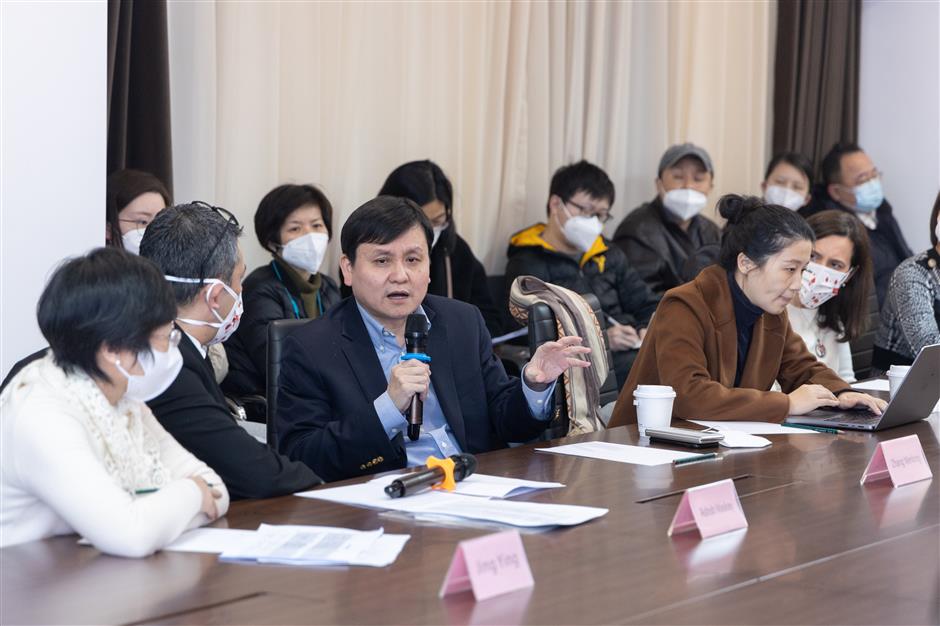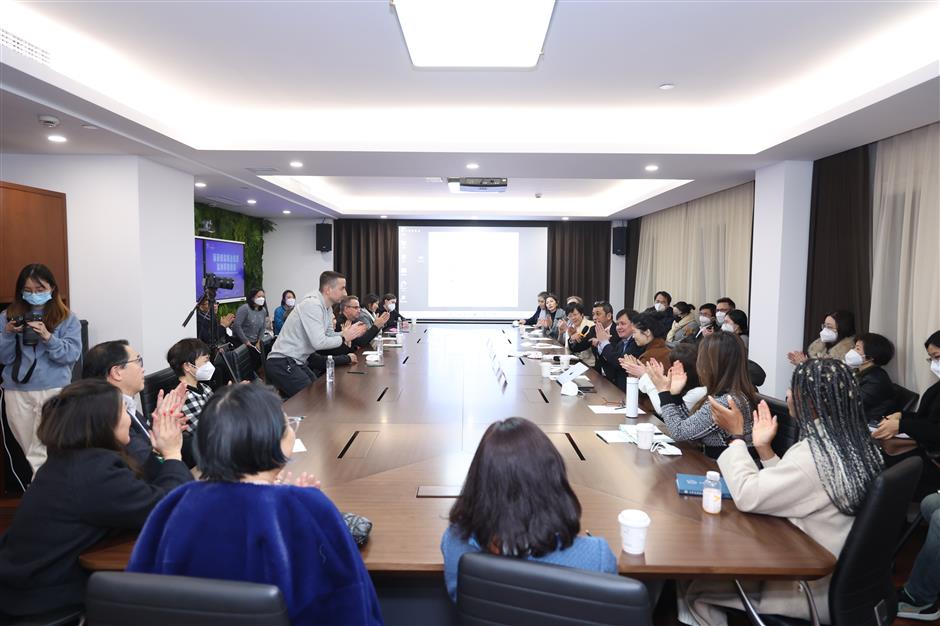政府新闻
上海专家汇报新冠情况 2023-01-13

Dr Zhang Wenhong answers questions from concerned expats in Shanghai during a meeting organized by the Shanghai People's Association for Friendship with Foreign Countries.
Local medical experts have shared information about the COVID-19 situation in Shanghai with representatives of the expatriate community easing their anxiety at a meeting organized by the Shanghai People's Association for Friendship with Foreign Countries.
Zhang Wenhong, leader of Shanghai's anti-COVID-19 clinical expert team and head of the center of infectious diseases at Huashan Hospital of Fudan University, and his colleague Dr Ai Jingwen responded to expats' concerns.
One of the most pressing questions was the severity of the current wave of COVID-19 in Shanghai, in which many people seem to show obvious symptoms, a contrast to the situation between April and June last year when 78 percent of patients were asymptomatic.
"Between April and June last year, we did polymerase chain reaction (PCR) tests for all and found all the asymptomatic patients," Zhang pointed out.
"But now, only people showing symptoms will do the tests, whether PCR or antigen tests.
"And also, the dominant strain of COVID-19 at that time was Omicron variant BA.2, but now BF.7 and BA.5.2 are the dominant variants, which have greater transmissibility and enhanced properties for immune system evasion."
He also pointed out the fact that many people received their last vaccination more than a year ago, which meant they had higher levels of antibodies and were better protected in April to June last year than now as vaccination can help ease symptoms and reduce risk of severity in COVID infections.
But Zhang also said that the portion of severe cases now is similar to that of last year.

Attendees applaud Dr Zhang Wenhong and Dr Ai Jingwen.
Although the proportion of critical patients is low, the absolute number is large, and the city is mobilizing medical institutions at all levels to treat COVID patients, especially community hospitals, the nearest medical resource to residents, he said.
"We have trained doctors at community hospitals and they have equipment and anti-virus medicines," he said. "People can get quicker treatment there and don't have to go to large hospitals, where they may have to wait for hours."
According to the Shanghai Health Commission, the city has been expanding community health service centers and improving their capacities.
From December 29 to January 2, it added 1,711 oxygen inhalation positions, 2,562 infusion therapy positions and 238 fever clinics. Medicines for COVID-19, oxygen meters and tanks, and other medical materials have been preferentially distributed to those community health centers.
A team of 132 top medical experts have been established to train doctors at community health service centers and provide consultation services.
Meanwhile, the city has temporarily included COVID-related drugs in the healthcare security system, which means patients can pay for the medicines for curing COVID infection with their medical insurance accounts.
In addition, it's applied not only in hospitals, but also 2,594 fever clinics and medical facilities within 231 senior-care institutions around the city, as well as 150 Internet hospitals and 1,538 retail pharmacies.
Zhang said most patients who received timely treatment at community hospitals had their symptoms relieved and did not become critical. People in critical conditions can be transferred to large hospitals through the city's the triage protocol quickly.
He said the tiered treatment system has greatly reduced the overwhelming burden on city-level hospitals.
On Tuesday alone, fever clinics in Shanghai received 43,000 visits, down 47.6 percent from the peak on December 22 last year. The patients the community health service centers received accounted for 56.8 percent of the total.
Based on study of pandemic development aroung the world, Zhang and Ai said though it's tough for the city now, they are confident that the severity of COVID-19 will get lower and lower in future waves of COVID because most of the population will have obtained some level of antibodies.
The expat attendees said the meeting was informative and helpful.
Murray King, chairman of the government affairs committee of the American Chamber of Commerce in Shanghai, said the meeting made him more confident about the future.
"I feel more confident knowing that it might be easier for us to withstand the future waves here," he said.
He said the idea of having a platform where members of the international community can interact with renowned medical practitioners as Ai and Zhang was very helpful.
"We're not medical professionals, so we hear from different voices in the media and the public in our community," he said. "It is very good to have factual, objective information. And I think it provides a greater level of confidence in the future. And I think that's exciting. I'm very excited about 2023 in Shanghai."
Source: Shanghai Daily
